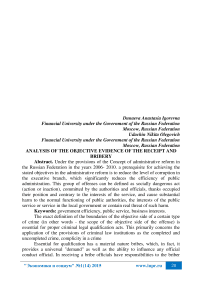Analysis of the objective evidence of the receipt and bribery
Автор: Dunaeva Anastasia Igorevna, Udachin Nikita Olegovich
Журнал: Экономика и социум @ekonomika-socium
Статья в выпуске: 1-2 (14), 2015 года.
Бесплатный доступ
Under the provisions of the Concept of administrative reform in the Russian Federation in the years 2006- 2010. a prerequisite for achieving the stated objectives in the administrative reform is to reduce the level of corruption in the executive branch, which significantly reduces the efficiency of public administration. This group of offenses can be defined as socially dangerous act (action or inaction), committed by the authorities and officials, thanks occupied their position and contrary to the interests of the service, and cause substantial harm to the normal functioning of public authorities, the interests of the public service or service in the local government or contain real threat of such harm.
Government efficiency, public service, business interests
Короткий адрес: https://sciup.org/140124538
IDR: 140124538
Текст научной статьи Analysis of the objective evidence of the receipt and bribery
The exact definition of the boundaries of the objective side of a certain type of crime (in other words - the scope of the objective side of the offense) is essential for proper criminal legal qualification acts. This primarily concerns the application of the provisions of criminal law institutions as the completed and uncompleted crime, complicity in a crime
Essential for qualification has a material nature bribes, which, in fact, it provides a universal "demand" as well as the ability to influence any official conduct official. In receiving a bribe officials have responsibilities to the briber last payment due its own advantage performance bribe-takers. "Providing services officer intangible nature to act or not committing them in the service of certain actions (e.g., cottage, verbally or in print, favorable reviews of his work, sexual relations, etc.) cannot be considered as bribery.
If the subject of a bribe used wealth and things turnover in the Russian Federation is prohibited or restricted, it puts the responsibility of law enforcers in addition to qualify bribery together with offenses under article of the Criminal Code, which establishes liability for illicit trafficking. A similar view is held by scholars who study issues of accountability for misconduct
When the subject of bribes are items withdrawn from circulation, the deed qualifies for combination with crime of trafficking of relevant items. So, if the bribe - precious metals, their actions should be classified under Articles 290 and 191 of the Criminal Code. This qualification is sufficient, provided that the duty officer does not include monitoring the turnover of the above items. In cases where the bribe is an official whose duties include control over the circulation of items withdrawn from circulation, the deed must also qualify under Art. 285 and 286 of the Criminal Code because the briber commits more and abuse of power and abuse of power. Here duty officer determined his official authority and relate to the implementation of rights and obligations which that person is endowed with an ex-officio
As bribes can only be considered an illegal fee. For example, the awarding official superior officer for the good work, and in accordance with applicable law cannot be considered as a bribe, however, keep in mind that as a bribe may be considered property benefits illegally granted and on behalf of the government, municipal authorities and organizations (eg, the head local administration at the expense of the municipality illegally offered for sale to the investigator for an end to the criminal case against his cousin).
It should be emphasized that the objective side of bribery does not include those actions for which fulfillment is given a bribe. To qualify as a completed deed receiving a bribe, it is enough to bribe was received for such actions. It does not matter whether or not the actually performed these actions.
It should again be recalled that the acceptance of a bribe - the formal structure of a crime. It is recognized consummated act since the adoption of an official at least part of the bribe. In cases where advance due to the bribe was not obtained due to circumstances beyond the control of the bribe-taker (e.g. due to suppression of the crime operational police officers at the time of transfer), his action should be qualified as an attempt to bribe on p. 3 art. 30 and Art. 290 of the Criminal Code.
The law says that the bribe receives official (in person or by proxy), but is silent about in whose favor granted pecuniary benefits. It is obvious that not only the provision of property in favor of the official himself, but also for the benefit of his relatives can be seen as a bribe. Bribe will provide property for the benefit of any other private person, if the official is interested in providing this. Thus, it is possible to obtain bribes in favor of third parties.
The adoption of an official "bribes" in the public or the public interest (for example, the head of the state institution receives from a commercial organization computer and office equipment necessary for the efficient operation of the institution, promising to provide the organization with certain benefits) is not considered as bribery, although it is definitely harmful and negative phenomenon.
Список литературы Analysis of the objective evidence of the receipt and bribery
- Kapinus O.S. Izmenenija v zakonodatel'stve o dolzhnostnyh prestuplenijah: voprosy kvalifikacii i osvobozhdenija vzjatkodatelja ot otvetstvennosti // Ugolovnoe pravo. 2011. N 2.//www.elibrary.ru.
- Galahova A.V. Dolzhnostnye prestuplenija/A.V.Galahova-. M. Jurist#, 2012-230s.
- Butova T.V. Interaction of civil society with government authorities. Bulletin of the University (State University of Management). 2013. №3. S. 119 -128.
- Mamedov S.A. K voprosu o sootvetstvii antikorupcionnyh norm, predusmotrennyh UK RF, mezhdunarodnym jetalonam // Chelovek: prestuplenie i nakazanie, 2014, №5 // www.elibrary.ru.


